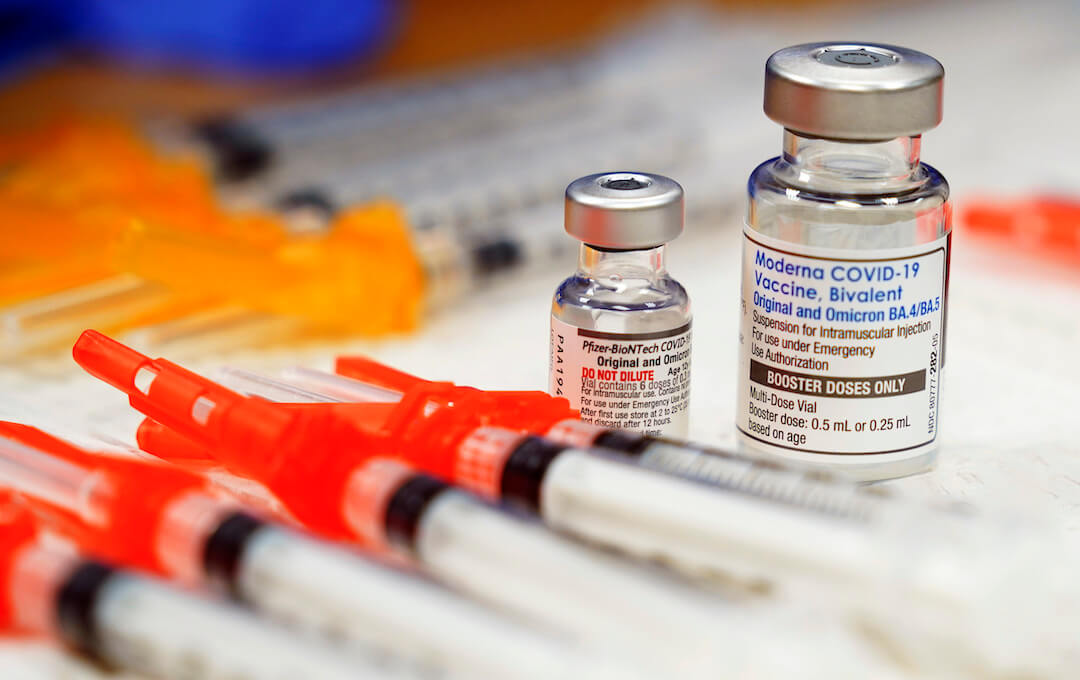Vaccines contaminated with undisclosed ingredients. Manufacturers facing liability. In an Oct. 21 thread on X, entrepreneur and anti-vaccine activist Steve Kirsch made alarming allegations about mRNA COVID-19 vaccines.
“You can now sue the mRNA COVID vaccine manufacturers for damages and the FDA is required to take the COVID vaccines off the market,” Kirsch wrote. “Why? Adulteration. The plasmid bioactive contaminant sequences were NOT pointed out to the regulatory authorities. It’s considered adulteration.”
In Kirsch’s fourth X post in the thread, he specifically said, “SV40 contamination” was the basis for his claim. SV40 stands for simian virus 40, a monkey virus found to cause cancerous tumors in lab animals.
Experts say there’s no evidence to support Kirsch’s claim that the mRNA COVID-19 vaccines are contaminated or contain ingredients that weren’t disclosed to regulators.
The U.S. Food and Drug Administration does not list details on its website about what, if anything, would constitute an adulterated vaccine, but the agency provides some information about other adulterated products. The FDA says cosmetics are adulterated if they contain “any poisonous or deleterious substance” that can make those products “injurious to users.” The FDA also says that “economically motivated adulteration” of food occurs when “someone intentionally leaves out, takes out, or substitutes a valuable ingredient or part of a food.”
We reached out to the FDA for comment, but did not receive a reply.
We asked Kirsch what evidence he had to support his claim, and he responded with several links, including to a nearly two-hour video on Rumble, a website known for spreading misinformation, and another to an X thread. He also sent his Substack article, which claimed that officials admitted “the vaccine is contaminated with SV40.”
Drug manufacturers say that noninfectious parts of the SV40 DNA sequence are used to create COVID-19 vaccines, but it’s routine and not a sign of the virus contaminating the vaccine.
The SV40 virus “is a naturally occurring virus and the virus itself is not included in either starting materials, plasmid DNA, or in the final product of the Pfizer-BioNTech COVID-19 vaccine,” said Kit Longley, a Pfizer spokesperson. “However, specific, non-infectious parts of the SV40 sequence, which are commonly used in the pharmaceutical industry, are present in starting material used by Pfizer and BioNTech.”
Longley said Pfizer’s COVID-19 vaccine was reviewed by regulatory authorities, including the FDA and the European Medicines Agency, and met safety and quality control requirements. Those authorities also approved the development and manufacturing specifications for Pfizer’s COVID-19 vaccine, Longley said, including a method for assessing residual DNA that is outlined by the World Health Organization and the FDA.
Longley said that residual DNA quality standards are applied similarly to other vaccines.
“Small amounts of residual DNA can be found in several approved vaccines, including influenza and hepatitis vaccines, which have been administered globally for more than 30 years,” Longley said.
We also contacted Moderna but did not hear back.
Where do the contamination claims originate?
The claims about “SV40 contamination” are linked to findings from a preprint paper that has not undergone peer review.
An April preprint paper found elements of a DNA sequence known as an “SV40 promoter” — a part of DNA that initiates the process of making an RNA copy of a gene’s DNA sequence — in two expired Pfizer-BioNTech COVID-19 vaccine vials. Kevin McKernan, one of the authors of the paper, told PolitiFact in June that the whole SV40 virus was not found in the vaccines.
Dan Wilson, a senior associate scientist at Janssen — which also developed a COVID-19 vaccine — said that the documents Pfizer submitted to the FDA included “the full sequence of the plasmid.” Wilson hosts “Debunk the Funk with Dr. Wilson,” a YouTube show that covers science misinformation.
The SV40 promoter wasn’t specifically highlighted in Pfizer’s disclosures to regulators and “did not need to be,” Wilson said, “because it is a nonfunctional part of the manufacturing process and not a bioactive ingredient in the drug product.”
Kirsch later amended his claim that the vaccine manufacturers failed to disclose the inclusion of an SV40 promoter DNA sequence in the vaccine.
“The SV40 promoter is found in all the vials and it was in the gene sequence that was provided to the regulators,” Kirsch wrote Oct. 21 in the thread on X. “The problem was that neither drug company ever pointed it out to the regulators.”
Is it ‘adulteration?’
“Tiny amounts of ingredients that do not make a difference do not lead to a vaccine being declared adulterated or taken off the market,” said Dorit Reiss, a law professor at University of California Law San Francisco who specializes in vaccine policy and legal issues.
Reiss pointed to examples:
- The 2010 discovery of genetic material from a pig virus in a rotavirus vaccine didn’t result in the vaccine being taken off the market; an investigation did not find safety concerns.
- In 2011, people expressed concerns that Gardasil, an HPV vaccine, contained DNA fragments. The FDA reported that Gardasil contained some specific DNA fragments that were not contaminants. “The presence of these DNA fragments is expected, is not a risk to vaccine recipients, and is not a safety factor,” the FDA said.
But if a contaminant were found in a vaccine, the FDA would investigate and decide if it is a safety issue, Reiss said.
Our ruling
Kirsch said that “the FDA is required to take the COVID vaccines off the market” because they are “adulterated.”
Experts said there’s no evidence that the mRNA COVID-19 vaccines contain previously undisclosed contaminants. Pfizer said noninfectious SV40 sequences were part of the starting material for the Pfizer vaccine, and the FDA and other regulators approved the vaccine manufacturing process.
Experts also said the FDA would not be required to take vaccines off the market even if something undisclosed had been detected. The agency typically would investigate the risks before making a determination.
We rate this claim False.
PolitiFact Researcher Caryn Baird contributed to this report.
This fact check was originally published by PolitiFact, which is part of the Poynter Institute. See the sources for this fact check here.







